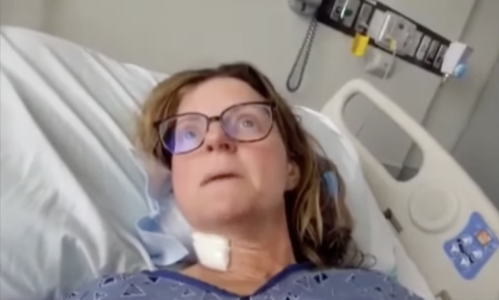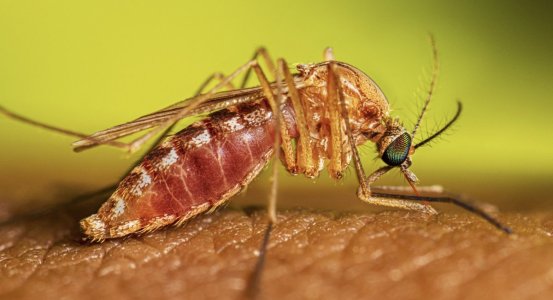Something alarming is moving state to state that is prompting nationwide health alerts
- Replies 0
There’s something more than just summer heat and evening breezes buzzing in the air.
As the season ramps up, a concerning illness has quietly reappeared in areas where it wasn’t seen before.
For some, a simple bite could turn life-threatening, and it’s already affecting individuals in unpredictable ways.
It’s not just another seasonal bug—it’s something health officials say you should be taking seriously.
Health officials have confirmed that West Nile virus, the leading mosquito-borne disease in the US, is now being detected in areas where it hadn’t previously appeared this season.
In Pennsylvania, mosquito samples collected in six Pittsburgh-area neighborhoods—Wilkinsburg, Schenley Park, Mt. Washington, Beltzhoover, Mt. Oliver, and Hazelwood—have tested positive for the virus.
So far, 14 other states—including Kentucky, California, Indiana, and Minnesota—have also reported West Nile virus found in mosquito samples.
These mosquitoes—mainly from the Culex species—acquire the virus by biting infected birds, which serve as natural reservoirs. The mosquitoes then pass the virus to humans through their saliva during a bite.
Most people recover, but not everyone is so lucky. Infected individuals don’t show any symptoms at all.
However, about 1 in 5 people develop flu-like symptoms, including fever, headache, body aches, joint pain, rash, vomiting, or diarrhea.
Roughly 1% of people who contract West Nile virus may develop neuroinvasive disease, a serious condition affecting the brain or spinal cord.
Also read: West Nile alert: Why hospitals turned away a man bitten by mosquito–Are you at risk?
This can result in encephalitis (brain swelling), meningitis, confusion, seizures, paralysis, or even death.
Among those who develop nervous system infections, about 1 in 10 may die.
Older adults, individuals with weakened immune systems, and those with chronic conditions are most at risk for these life-threatening complications.
Real cases show the danger is very real. Anne Dillard from Georgia was left “practically paralyzed” from the waist down after being infected.
After collapsing at home, she was taken to Emory University Hospital. While she retained sensation, she lost all muscle strength, unable to sit, stand, or walk.
She also suffered from lethargy, appetite loss, and a spreading rash during her illness.

John Proctor VI, an 18-year-old from Missouri, began feeling dizzy and developed headaches in early August.
Within days, his condition worsened with slurred speech, muscle weakness, and total paralysis.
Doctors diagnosed a rare neuroinvasive form of West Nile virus after ruling out a stroke.
Now, the recent high school graduate, who was preparing to become a diesel mechanic, relies on a ventilator and is battling stroke-like symptoms and pneumonia.
His parents described the experience as sudden and unexpected.
What’s behind the virus spreading farther than before? Experts believe shifting climate patterns—especially warmer and more humid conditions—are creating better environments for mosquitoes to breed.
As temperatures rise, areas that were once too cool for Culex mosquitoes are now hospitable.
Longer mosquito seasons, faster lifecycles, and increased viral transmission rates all mean more opportunities for West Nile to spread.
Some fear that this shift could also boost the presence of other diseases such as malaria, Zika, and dengue fever.
Local health departments are stepping up. Counties like Allegheny in Pennsylvania are treating known mosquito breeding grounds with larvicide every spring.
Officials also deploy traps to monitor for West Nile and other viruses and increase public alerts when infected mosquito populations are discovered.
Spraying insecticides at night—when mosquitoes are most active—is one of their key strategies.
Nicholas Baldauf of Allegheny County Health Department advises: “Residents can prevent mosquito bites by using insect repellent on exposed skin or choosing to wear long sleeves and pants. Both methods are effective at reducing or eliminating the possibility of getting a mosquito bite.”
Also read: Are you using the wrong mosquito repellent? Only two things actually work
Here’s how to protect yourself and your family:
Severe infections may require hospitalization for intensive supportive care, including IV fluids and breathing assistance.
While the spread of West Nile virus is serious, remember that most people recover fully.
By staying informed and taking common-sense precautions, you can significantly reduce your risk.
Let friends, neighbors, and family members know what to watch for—it may be more important now than ever before.
Read next: New virus discovery in uncharted region causes future pandemic concerns–Protect yourself now!

Have you or someone you know been impacted by West Nile virus or another mosquito-borne illness? What are your favorite tips for avoiding bites during summer? Drop your thoughts in the comments below—your insight could help protect someone else!
As the season ramps up, a concerning illness has quietly reappeared in areas where it wasn’t seen before.
For some, a simple bite could turn life-threatening, and it’s already affecting individuals in unpredictable ways.
It’s not just another seasonal bug—it’s something health officials say you should be taking seriously.
Health officials have confirmed that West Nile virus, the leading mosquito-borne disease in the US, is now being detected in areas where it hadn’t previously appeared this season.
In Pennsylvania, mosquito samples collected in six Pittsburgh-area neighborhoods—Wilkinsburg, Schenley Park, Mt. Washington, Beltzhoover, Mt. Oliver, and Hazelwood—have tested positive for the virus.
So far, 14 other states—including Kentucky, California, Indiana, and Minnesota—have also reported West Nile virus found in mosquito samples.
How infection occurs
The illness is not contagious through person-to-person contact. It spreads only through the bite of infected mosquitoes.These mosquitoes—mainly from the Culex species—acquire the virus by biting infected birds, which serve as natural reservoirs. The mosquitoes then pass the virus to humans through their saliva during a bite.
Most people recover, but not everyone is so lucky. Infected individuals don’t show any symptoms at all.
However, about 1 in 5 people develop flu-like symptoms, including fever, headache, body aches, joint pain, rash, vomiting, or diarrhea.
Roughly 1% of people who contract West Nile virus may develop neuroinvasive disease, a serious condition affecting the brain or spinal cord.
Also read: West Nile alert: Why hospitals turned away a man bitten by mosquito–Are you at risk?
This can result in encephalitis (brain swelling), meningitis, confusion, seizures, paralysis, or even death.
Among those who develop nervous system infections, about 1 in 10 may die.
Older adults, individuals with weakened immune systems, and those with chronic conditions are most at risk for these life-threatening complications.
Long-term effects can linger even after recovery
Survivors of severe West Nile cases have reported persistent problems such as memory loss, chronic fatigue, muscle tremors, or permanent neurological damage.Real cases show the danger is very real. Anne Dillard from Georgia was left “practically paralyzed” from the waist down after being infected.
After collapsing at home, she was taken to Emory University Hospital. While she retained sensation, she lost all muscle strength, unable to sit, stand, or walk.
She also suffered from lethargy, appetite loss, and a spreading rash during her illness.

Anne Dillard from Georgia was left paralyzed below the waist after being infected. Image Source: Atlanta News First / YouTube
John Proctor VI, an 18-year-old from Missouri, began feeling dizzy and developed headaches in early August.
Within days, his condition worsened with slurred speech, muscle weakness, and total paralysis.
Doctors diagnosed a rare neuroinvasive form of West Nile virus after ruling out a stroke.
Now, the recent high school graduate, who was preparing to become a diesel mechanic, relies on a ventilator and is battling stroke-like symptoms and pneumonia.
His parents described the experience as sudden and unexpected.
What’s behind the virus spreading farther than before? Experts believe shifting climate patterns—especially warmer and more humid conditions—are creating better environments for mosquitoes to breed.
As temperatures rise, areas that were once too cool for Culex mosquitoes are now hospitable.
Longer mosquito seasons, faster lifecycles, and increased viral transmission rates all mean more opportunities for West Nile to spread.
Some fear that this shift could also boost the presence of other diseases such as malaria, Zika, and dengue fever.
Local health departments are stepping up. Counties like Allegheny in Pennsylvania are treating known mosquito breeding grounds with larvicide every spring.
Officials also deploy traps to monitor for West Nile and other viruses and increase public alerts when infected mosquito populations are discovered.
Spraying insecticides at night—when mosquitoes are most active—is one of their key strategies.
What can residents do to stay safe?
Policy experts and vector control specialists stress the importance of personal prevention.Nicholas Baldauf of Allegheny County Health Department advises: “Residents can prevent mosquito bites by using insect repellent on exposed skin or choosing to wear long sleeves and pants. Both methods are effective at reducing or eliminating the possibility of getting a mosquito bite.”
Also read: Are you using the wrong mosquito repellent? Only two things actually work
Here’s how to protect yourself and your family:
- Drain standing water weekly: Check buckets, birdbaths, gutters, old tires, corrugated pipes, and unused pools. Mosquitoes can breed in just half an inch of water.
- Use EPA-approved repellents: Apply products containing DEET, picaridin, or oil of lemon eucalyptus, especially during dawn and dusk.
- Cover up when outdoors: Wear long sleeves, pants, and socks when spending time outside.
- Seal up your home: Use screens on windows and doors to keep mosquitoes out.
- Report dead birds: They can be an early sign of virus activity in your area.
Severe infections may require hospitalization for intensive supportive care, including IV fluids and breathing assistance.
While the spread of West Nile virus is serious, remember that most people recover fully.
By staying informed and taking common-sense precautions, you can significantly reduce your risk.
Let friends, neighbors, and family members know what to watch for—it may be more important now than ever before.
Read next: New virus discovery in uncharted region causes future pandemic concerns–Protect yourself now!
Key Takeaways
- West Nile virus has been detected in mosquitoes across Pennsylvania and 14 other states, including Kentucky, California, Indiana, and Minnesota.
- Although infections are asymptomatic, 1 in 5 people may experience flu-like symptoms, and about 1% may suffer neuroinvasive, potentially fatal complications.
- A Georgia woman and a Missouri teenager have recently suffered life-altering consequences from West Nile, including paralysis and ventilator dependence.
- Health officials urge residents to drain standing water, use insect repellent, wear protective clothing, and remain especially cautious during dusk and dawn.







